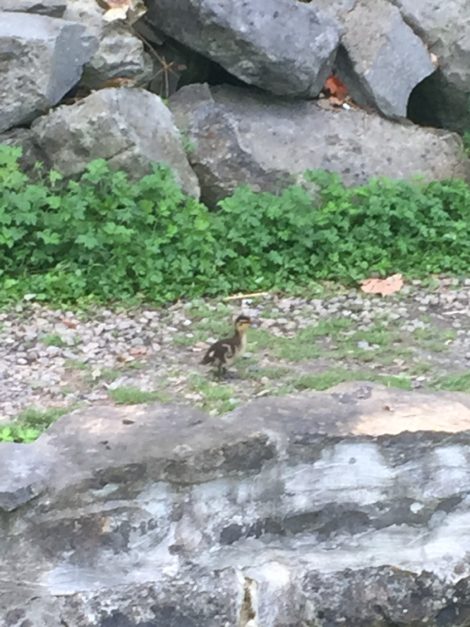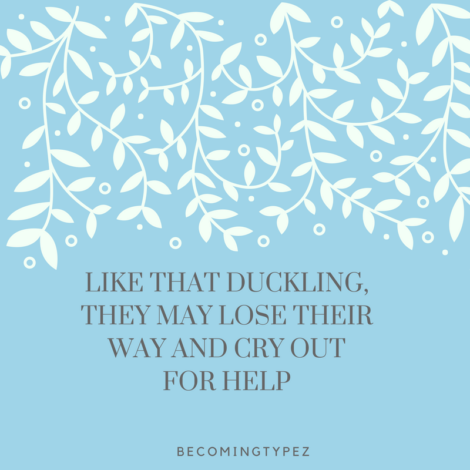I’ve always loved ducks. They’re silly and beautiful, graceful and awkward. The embodiment of cheerful contradiction. And the image of a line of ducklings waddling behind the mama duck? The epitome of maternal leadership, in my opinion.
My husband and I had just enjoyed a terrific breakfast at a sidewalk cafe where we met a friendly, young couple seated next to us. They, being recent transplants to the city, wanted to share some of their favorite insider gems. We told them we’d been visiting this upstate city for years, but our visits would probably be less frequent as our daughter had just graduated from the city’s college. Our conversation swayed away from the city’s many attractions to our daughter’s plans. The four of us engaged in a terrific talk about the gift of time and the need to take it while finding your place in the world.
Buoyed by our great talk, we set off on a walk through the city’s central park. Designed by the same architect of the Central Park, it’s a gem. After visiting my favorite sculptures, my husband and I headed towards the park’s exit. My attention was drawn back into the park, though, by a family of ducks swimming effortlessly in a stream. I walked towards the stream, watching as the mother duck hopped out of the stream and led her brood of ten, formed in an orderly line, across the walking path. The mama scaled the rocky slope with ease, leading the way for her ducklings. Halfway up, the first in line began to struggle. The second duckling stayed close while the remaining ducklings turned around and found an alternate route to their mama atop the hill.
I turned to my husband, “What will they do?” I was worried these two ducklings would be left behind. Realizing it could not walk up the rock, the duckling decided to leap. Its sibling followed suit. In moments, all of the ducklings had made their way to the top of the hill. I cheered a little yay for the ducklings. Their grit had prevailed and the duck family was again reunited under the cover of greenery.
Our duck celebration was short lived. We heard a high-pitched chirp from the stream below. Peeking down we saw a lone duckling swimming in the stream. We quickly figured out that this duckling was the eleventh duckling, separated from its brood!
I turned to my husband and said, ““Oh, no! What do you think will happen to this little one?”
“I have no idea,” he said.
We stood there at the side of the stream watching the duckling swim to and fro. Its chirps got louder as it became more agitated. We stood by helpless, but rooting for this little guy to be reunited with its family. From atop the hill, we heard the mama duck vocalizing to the duckling. At last the duckling seemed to hear her and it found a rock on the edge of the stream and made its way out of the stream. It took a step onto the path and chirped some more. It paused, listening for its mama’s reply.

Just as it appeared we were about to witness a happy reunion, a little boy walking on the path with his family trailing behind spied the duckling. “Look!” he shouted, pointing excitedly and running towards the duckling. “A baby duck! A baby duck!”
Instinctively, the duckling froze. As the little boy neared, it ran back to the stream and hopped back in the water. The little boy moved closer to the stream to get a better look as the duckling swam in the opposite direction, chirping louder.
Ugh. I was frustrated. The little boy’s innocent enthusiasm had triggered the duckling’s fight or flight response and it had chosen to flee.
“The duckling’s been separated from its family,” I said across the stream to the little boy and his mother. The mother took her son by the hand and led him away. I stood on the other side, watching. Feeling helpless.
Where was the mama duck? Why wasn’t she helping? The duckling swam towards a group of ducks swimming downstream; but they quacked loud quacks that seemed to say, “beat it!” The duckling frantically swam away, into a protected spot of stream and chirped even louder. The duckling was clearly exhausted.
I walked to the bench where my husband was sitting and I said, “I wish I could do something to help.” “I know,” he answered. We sat there quietly, watching. Would this little duckling try again? Or would it remain there at the edge of the stream, alone.
After some time, the mother duck emerged from her hiding spot atop the hill. She scurried down the hill followed by the other ducklings. She ran across the path and jumped into the stream. The other ducklings followed behind. The lone duckling swam quickly towards its mother and found its place in line with its brothers and sisters. All eleven followed their mama’s lead to the edge of the stream.
“Well, that was good,” I said smiling at my husband.
“Yup,” he smiled back. “I was beginning to think we might spend our entire day here,” he teased.
As we walked towards the park exit, I couldn’t help but make the connection between what we’d just witnessed and our breakfast conversation about the gift of time.
Watching the duckling’s struggle had made me so uncomfortable. I’d wanted to help, solve its problem, make everything all better. But I knew I couldn’t intervene with a wild animal. It was not my place.
And isn’t this the same struggle we face continually with our own children? Watching them struggle and lose their way triggers uneasiness. And all too often a desire to jump in “fix” what appears to be “broken.”
But that mama duck stayed put, remained engaged, but from a distance. The duckling needed time to struggle, space to try to figure things out on its own, learn. And she gave that gift of time before coming to lead the way.
“Wow,” I marveled. “That mother duck taught me a great lesson, just now.”
Regardless of age, our children are going to face challenges. And like that duckling, they may lose their way and cry out for help. But we, parents, must give our children the gift of time. Time to make mistakes, time to try, time to struggle, time to figure things out and find their own way. Although it can be uncomfortable, downright painful to witness, it’s our responsibility to step back and exercise patience. And when they’ve invested the necessary time? Tried a bunch of solutions? Found themselves in a corner, truly in need of help to finding their way back to their path? That’s when we can step in and lead.
©Kathie Z.
